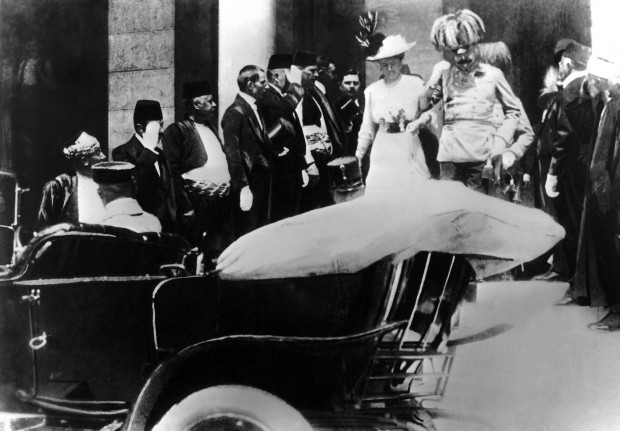by Jim Lobe
In just a week, 2014 will dawn upon us, and, as we approach the mid-year mark, the number of op-eds, retrospectives, and documentaries about the Great War that broke out 100 years before, will likely be overwhelming. The question is what, if any, lessons will be drawn and how they will be applied, if at all, to today.
Hopefully, it won’t be too late by the time we mark the “Guns of August” to prevent the United States — and specifically, the U.S. Congress – from having embarked on a new “march of folly” — war with Iran. But if bipartisan stalwarts of the Israel lobby — led by Sens. Mark Kirk and Robert Menendez — get their way with their new sanctions legislation, which almost perfectly echoes the demands made by Israeli Prime Minister Binyamin Netanyahu for Iran to dismantle virtually all of its nuclear program, I suspect that’s where we’ll be headed.
Perhaps that’s partly why Margaret MacMillan, the author of The War That Ended the Peace: The Road to 1914, suggested in a recent “Brookings Essay,” entitled “The Rhyme of History: Lessons of the Great War,” that Russia’s seemingly unconditional and ultimately disastrous commitment to Serbia in the name of “Pan-Slavism” — as well as the infamous “blank check” issued by Germany’s Kaiser Wilhelm to Austria after the assassination in Sarajevo of Archduke Franz Ferdinand — may indeed hold important lessons for today:
Great powers often face the dilemma that their very support for smaller ones encourages their clients to be reckless. And their clients often slip the leading strings of their patrons. The U.S. has funnelled [sic] huge amounts of money and equipment to Israel and Pakistan, for example, as China has done to North Korea, yet that has not given either the Americans or the Chinese commensurate influence over the policies of those countries. Israel, while hugely dependent on America, has sometimes tried to push Washington into taking pre-emptive military action.
Of course, that’s precisely what is taking place before our eyes in the U.S. Congress today. After all, when 27 senators sign onto what I called the Kirk-Menendez-Schumer Wag the Dog Act of 2014 that explicitly calls for the U.S. government to “stand with Israel and provide, in accordance with the law of the United States and the constitutional responsibility of Congress to authorize the use of military force, diplomatic, military, and economic support to the Government of Israel in its defense of its territory, people, and existence [if the Israeli government] is compelled to take military action in legitimate self-defense against Iran’s nuclear weapon program,” you can’t help but be reminded of Russia’s incredible stupidity in reflexively backing Serbia and the radical nationalist groups that it supported in the run-up to the war, not to mention Wilhelm’s blank check to an Austria bent on humiliating and crushing the Serbs.
Ten years ago, Anatol Lieven drew the former parallel in his still-very-relevant book “America: Right or Wrong” (Oxford University Press):
If anything, the [U.S.-Israel] alliance is beginning to take on some of the same mutually calamitous aspects as Russia’s commitment to Serbia in 1914, a great power guarantee which encouraged parts of the Serbian leadership to behave with criminal irresponsibility in their encouragement of irredentist claims against Austria, leading to a war which was ruinous for Russia, Serbia, and the world.”
Lieven went on to document the various trends over the past half century that have increasingly enabled the Israeli tail to wag the U.S. dog — trends that have only deepened during the past decade despite the steadily rightward trajectory of Israel’s government and the advent of a Democratic administration clearly wary of Israel’s adventurism. Unfortunately, that administration gets very little support from a Congress that, when it comes to Israel and Iran, has, as former senior AIPAC official Douglas Bloomfield told me last week, been “on auto-pilot” for years, just as hardliners in the militaries and imperial courts in St. Petersburg and Vienna were one century ago.
No doubt most of the senators who sign on to the Wag Act don’t want war (although their main cheerleader, Lindsey Graham, has been calling for it for several years now) and sincerely believe that a new sanctions bill will only strengthen Obama’s hand in negotiations with Iran and that Tehran’s threat to abandon the talks is simply bluster. No doubt some pan-Slavists in St. Petersburg believed that the partial mobilization ordered by the Czar, who, like Obama, tried hard to keep diplomacy alive, would be sufficient to persuade Vienna to back down and give the Serbs a face-saving way out. (“Soon I shall be overwhelmed by pressure brought upon me…to take extreme measures which will lead to war,” Nicholas wrote to his cousin, Kaiser Wilhelm, as Austria declared war. “To try and avoid such as a calamity as a European war, I beg you in the name of our old friendship to do what you can to stop your allies from going too far.”) But it didn’t work out that way.
Of course, there are important differences between today and 100 years ago, including the fact that Iran doesn’t have an obvious great-power patron as Russia was to Serbia and Germany to Austria back then. Similarly, it was clear that some of the parties were eager for war (although not the one that they eventually got) in 1914, while the only country that openly threatens it today is Israel (although, as Michael Ledeen has pointed out, it has long been Israel’s policy to try to get the U.S. to attack first).
But some of the similarities are deeply disturbing, not least the “blank check” treatment that Israel enjoys in Congress and the confidence that only threats and pressure work against less powerful and presumably morally inferior foes. How timely it is to remember Wilhelm’s joyful reaction to reports that Austria would not retreat from the maximalist demands in its ultimatum against Serbia and how depressed the Serbs were when faced with the choice of humiliation or war:
“Bravo! One would not have believed it of the Viennese!…How hollow the whole Serbian power is proving itself to be; thus, it is seen to be with all the Slav nations! Just tread hard on the heels of that rabble!” [Shades of Charles Krauthammer.]
Or how prescient British Prime Minister Lord Asquith was in analyzing the likely consequences of the Austrian ultimatum:
But the Austrians are quite the stupidest people in Europe …, and there is a brutality about their mode of procedure, which will make most people think that is a case of a big Power wantonly bullying a little one. Anyhow, it is the most dangerous situation of the last 40 years.
Hopefully, the Great War’s centenary will spur some reflection in the Capitol come the new year.






Christopher Clark wrote a diplomatic history of the origins of the conflict, published this year: “The Sleepwalkers: How Europe Went to War in 1914”. But it was revisionist, his history belied the title. According to Clark, it wasn’t sleepwalking that produced WW1, it was two fully conscious state actors, France and Russia. Both countries actively sought and promoted the war, feeling that this was the only way they could achieve their ends. France because it stood to gain back the province lost to Germany in 1870, Alsace-Lorraine. Russia because it had lost fresh water ports in the Japanese War of 1905 and was relying on gaining control of the Turkish Dardanelles. Both countries allied themselves to achieve their ends and made use of the Serbian issue to push their own agendas.
This was a well-received WW1 history, although god only knows how many versions there are of “the origins”. In any case, it’s interesting to reflect more on the idea of Russia using the Serbs, not a patron of Serbia as the US is of Israel. I doubt very much there was a Serbia Lobby in Tzarist Russia.
Clark does not portray Germany as the aggressor. Also, Austria-Hungary was not a ‘client state’ of Germany.
Can any of you think of any precedent in history where a small weak state harnesses the resources of a great power?
To Brenda, Interesting question. I’ll go out on a limb here by saying you mean Israel re: the U.S., Iran. As others have said, revisionism seems to the meme today. Consider that if you’re referring to Israel, it’s hardly a small weak state, thanks to the French, our trusted Ally for all these many many years, along with the U.S. of course, (though I wouldn’t think it to be so if it wasn’t for the rampant corruption of our Government, internally driven, I might add). As the saying goes, follow the money, as in just who controls it, who benefits from it, but in the end, who gets stuck with the bill?
Norman, old friend, I was just thinking about getting back to you on your question: Where is Superman when we need him?
Israel is a small weak state in comparison to a great power like the United States. Doesn’t mean it doesn’t have teeth, but overall a state like Israel should not be able to wag the tail of the big dog. Not unless big dog consents and is getting something out of it in return — like Russia and Serbia before WW1. I was always skeptical of the tail wags the dog theory until recently. That egregious Senate bill challenging Obama’s foreign policy negotiations with Iran, and the even more egregious rider putting the US military at the disposal of Netanyahu for a war with Iran.
So that brings me to your question: where is Superman? Right now he’s zooming over China and places east generally, leaving Kerry in charge of the Middle East shop. Maybe Obama is upsetting a longtime Israel/US consensus. Maybe he is doing a revolution, not playing along nicely, jumped the fence, gone off the farm. Maybe he’s ‘doing history’. I think if Netanyahu tries to disrupt the peace process negotiations by striking Iran — which he would dearly like to do — I don’t think the Israeli military will follow his order. Otherwise he would have done it by now.
Things are not going very well for Israel right now. It’s in a bind. If it fails to settle with the Palestinians the EU moves in quickly with sanctions and other mayhem. Our few US civil society sanctions — churches, academic groups — they are only a drop in the bucket compared with what the Europeans are brewing up. Ordinarily this would be cause for terrific consternation — the Israelis do not take no for an answer, they could be very dangerous if pushed too far. But I’ve read enough of the Israeli press over the last few years to be optimistic that Israeli institutions will revolt before bringing on WW3.
Say a prayer for Obama, Norman. Happy New Year!
Israel is of course the strongest military power in the Middle East, in terms of offensive striking power. Zero need for nukes.